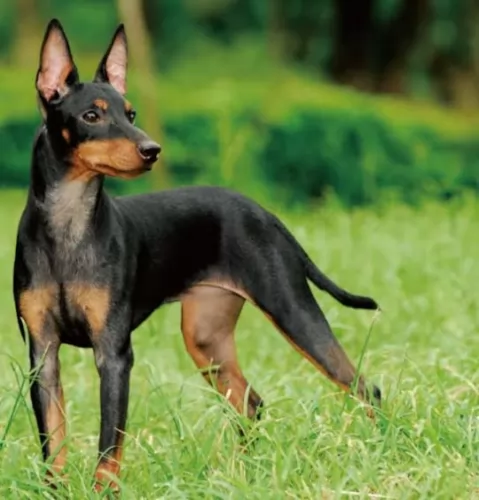 Petzlover
Petzlover Both Scotch Collie and Toy Manchester Terrier are originated from United Kingdom. Scotch Collie may grow 31 cm / 13 inches higher than Toy Manchester Terrier. Scotch Collie may weigh 28 kg / 62 pounds more than Toy Manchester Terrier. Both Scotch Collie and Toy Manchester Terrier has same life span. Both Scotch Collie and Toy Manchester Terrier has almost same litter size. Scotch Collie requires Moderate Maintenance. But Toy Manchester Terrier requires Low Maintenance
Both Scotch Collie and Toy Manchester Terrier are originated from United Kingdom. Scotch Collie may grow 31 cm / 13 inches higher than Toy Manchester Terrier. Scotch Collie may weigh 28 kg / 62 pounds more than Toy Manchester Terrier. Both Scotch Collie and Toy Manchester Terrier has same life span. Both Scotch Collie and Toy Manchester Terrier has almost same litter size. Scotch Collie requires Moderate Maintenance. But Toy Manchester Terrier requires Low Maintenance
 The landrace breed, which started in the highlands of Scotland is known as the Scotch Collie. There were at the time two types of collies – the Rough or long haired collie and the smooth or short haired collie. The Scotch Collie is considered to be from a line of very ancient herding dogs. It might have existed in the days of the Roman Empire, these herding dogs might have included the Native Celtic Dogs, Roman Cattle Dogs, Gordon Setter, Viking Herding Spitzes and Irish Setters.
The landrace breed, which started in the highlands of Scotland is known as the Scotch Collie. There were at the time two types of collies – the Rough or long haired collie and the smooth or short haired collie. The Scotch Collie is considered to be from a line of very ancient herding dogs. It might have existed in the days of the Roman Empire, these herding dogs might have included the Native Celtic Dogs, Roman Cattle Dogs, Gordon Setter, Viking Herding Spitzes and Irish Setters.
In its native land the Scotch Collie is often called the colley dogs, coaly and cooley. Collie comes from the Scottish words for black coal – or the Coaley Sheep they herded. In addition to herding, the Scotch Collie also acted as a hunter and guard dog for its family. A large group of these collies were exported to America to work on family farms. Soon they were so popular they became family pets. They were first shown in both England and America in in the mid to late 1800’s.
The Scotch Collie Club was formed in 1885 and the breed accepted into the AKC the same year. The Collie Club of America started the following year. The AKC eventually dropped the moniker Scotch in favor or Rough and Smooth Collie. This move also separated the show dogs from the still working/herding Scotch Collies.
Aa time went on and the collie became more prominent in conformation competitions, some breeders mixed in the Greyhound and perhaps the Borzoi to get the collie we see today. The Scotch Collie itself eventually lost its independent recognition in the UKC and the NKC. It was mixed in with the English Shepard, but it was an important element in the development of the Australian Shepard, Shetland Sheepdogs and Border Collies.
The breed had a revival of sorts in the early 2000’s as the Old Time Scotch Collie. Any type of farm collie in America and Canada can be registered in the OTSCA. They are more often referred to as Old Time Farm Shepherds to avoid confusion them with the very popular collies. In 2017 there were 174 of these OTSCA dogs. Collies today have less working instincts, and the heeling instinct seems to be gone.
Today the show version of the Scotch Collie is recognized by both the AKC and UKC in the herding group.
It has been said of the Scotch Collie that they have “the majesty of a lion, the pride of a great thoroughbred stallion, the confidence of a Winston Churchill.”
 The Toy Manchester Terrier comes from Manchester and came about by breeding the Manchester Terrier with smaller dog breeds.
The Toy Manchester Terrier comes from Manchester and came about by breeding the Manchester Terrier with smaller dog breeds.
Looking like a Doberman Pinscher, the American Toy Manchester Terrier Club was formed in the 1930s and the dog was recognized in 1938 by the American Kennel Club.
It is believed that the Black and Tan Terrier was also possibly crossed with Whippets. The dog is categorized as a Terrier or as a Toy breed.
 This Scotch Collie is an athletic, intelligent, well-balanced and alert dog. This collie has no exaggerated features like the long nose/muzzle of the current collies. This Scotch Collie is sound in mind and body, a hard working dog. He is hearty and versatile. They are longer than they are tall. Their heads are moderate and the stoop is well defined. They have a wide, flat skull. Their lips are tight and they are fitted well.
This Scotch Collie is an athletic, intelligent, well-balanced and alert dog. This collie has no exaggerated features like the long nose/muzzle of the current collies. This Scotch Collie is sound in mind and body, a hard working dog. He is hearty and versatile. They are longer than they are tall. Their heads are moderate and the stoop is well defined. They have a wide, flat skull. Their lips are tight and they are fitted well.
Their ears are also moderate in size and pointed or partially erect. They should not have long or droopy ears. They have eyes that might be oblique, almond, and round. The eyes are usually brown and merles may have blue eyes. The breed has a deep chest, broad shoulders and a long tail. There are also some bobtails that occur naturally.
 Looking much like a small Doberman Pinscher, the Manchester Terrier is the miniature version of the standard Manchester.
Looking much like a small Doberman Pinscher, the Manchester Terrier is the miniature version of the standard Manchester.
He weighs in the region of 2 to 5kg and stands at between 25 and 30cm in height. He has a sleek, short coat which is black and tan. He is lithe and muscular, bred back in the day to kill vermin. He has large, broad erect ears which taper to a point.
The Toy Manchester Terrier is a gentle but energetic dog, a great choice for an active family. Throw a ball and you’ll see how he loves to give chase, and he’ll also love his walk every day.
They’re adaptable too, so if you live in the countryside or the city, he can be your friend and companion there.
Training and socialization are excellent for all dogs, particularly ones with a stubborn, independent streak such as with this dog. He is intelligent and will learn quickly. They’re alert too so you can expect him to be a good watchdog.
 3.Adaptability - Scotch Collies are versatile and adaptable. There is no need to crate them as they are not destructive. If you have a large run or kennel, they can live anywhere. However they are happiest on farms and open lands.
3.Adaptability - Scotch Collies are versatile and adaptable. There is no need to crate them as they are not destructive. If you have a large run or kennel, they can live anywhere. However they are happiest on farms and open lands.
 The Toy Manchester Terrier is full of beans and will provide you with lots of fun. They're sociable and love being in the presence of their human family.
The Toy Manchester Terrier is full of beans and will provide you with lots of fun. They're sociable and love being in the presence of their human family.
They get on well with kids and pets in the home and are brave, alert and feisty. He may be small, but he is full of personality and he’s just waiting to fill your home with his bright charm, promising to be a loyal, loving pet.
 The old line breed was hearty with few health issues. The ones they did have included:
The old line breed was hearty with few health issues. The ones they did have included:
• Skin problems - can have skin diseases like mange that may or may not be acute, may have allergies or sensitivities.
 The Toy Manchester Terrier is a healthy dog breed and can reach anything between 14 and 16 years of age. Good food and exercise can stave off illness, but there are some common dog illnesses that any dog can succumb to.
The Toy Manchester Terrier is a healthy dog breed and can reach anything between 14 and 16 years of age. Good food and exercise can stave off illness, but there are some common dog illnesses that any dog can succumb to.
This occurs when there are problems with the thyroid hormone. You might find skin problems with your pet, lethargy and even hair loss. Your vet might suggest hormone replacement, but there are always natural products for dogs too.
This is when there is degeneration of the head on the femur bone so that there is also joint inflammation.
It is thought that the condition is brought on by problems with blood supply to the femoral head. Lameness sets in and then your vet will want a medical history of your pet’s health.
 1Feeding the puppy - The Scotch Collie is not a medium dog nor is it a large dog. It is somewhere in-between. Because of this there is some discretion in not only how much you feed your puppy, but also what you feed. Normally we would feed according to breed size but here you need a high quality formula that is made for working breeds. The puppy will need enough calories to meet their high energy needs. Feed at least 3-4 times a day.
1Feeding the puppy - The Scotch Collie is not a medium dog nor is it a large dog. It is somewhere in-between. Because of this there is some discretion in not only how much you feed your puppy, but also what you feed. Normally we would feed according to breed size but here you need a high quality formula that is made for working breeds. The puppy will need enough calories to meet their high energy needs. Feed at least 3-4 times a day.
2.Feeding the adult - you need a high quality formula that is made for working breeds. The adult will need enough calories to meet their high energy needs. Feed at least 2 times a day.
There is a high need for exercise starting with walks or jog but that is not going to be enough. The Scotch Collie is not a Border Collie or a Corgi in terms of energy, but they are not couch potaoes. They need more than access to a yard. They need a job or they need defined exercise and play. The daily walk or jog will do it but intense play is better.
 Make sure you provide your pet with yard space and that he is well exercised and occupied. Provide him with exercise and give him attention.
Make sure you provide your pet with yard space and that he is well exercised and occupied. Provide him with exercise and give him attention.
Provide him with a dry, quiet resting place. If he spends time outdoors, he must have shade and sun as well as shelter from the rain.
Provide him with good food in his own special bowls. If you feed him dry kibble, make sure to give him a quality one with vitamins and minerals. The food’s labeling will guide you as to what to buy, but your vet is also a good source of useful information. Try to give him some home-made food too. Boiled chicken, brown rice, sweet potatoes and spinach for instance, are excellent examples. Dont add in exotic spices and curries that can give him an upset stomach. Make sure he has a constant supply of fresh, cool water.
Get your Manchester to the vet if he is ill. Make sure his vaccines are up to date.
He has short hair and is a low maintenance dog. Brush him once or twice a week to keep his shiny coat healthy. Check inside his ears for redness and give him a good check-over to make sure he doesn’t have any odd looking lumps or sores on his body.